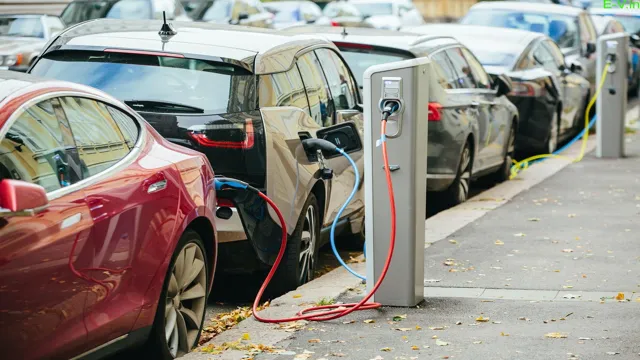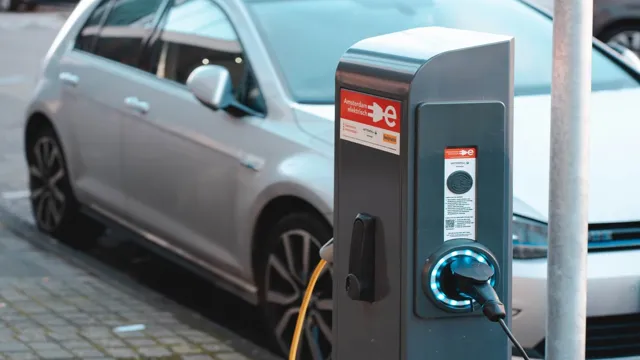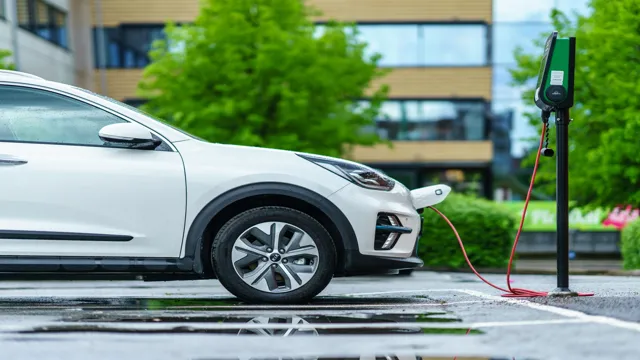Revolutionizing the Roads: The Surging Popularity of Electric Cars through game-changing Technological Advancements
Electric cars have become a popular method of transportation over the past few years as more and more people are opting for environmentally friendly options. Technological advancements have played a significant role in the rise of popularity for electric cars. With the innovation of new and more efficient battery technology, increased charging infrastructure, and improved aerodynamics, people are finding it easier and more convenient to own an electric car.
Additionally, electric cars are becoming more affordable, making it accessible for a wider range of people. The introduction of electric vehicles has been a game-changer in the automobile industry; let’s take a closer look at how technological advancements are driving this change.
Improved Battery Technology
Electric cars have come a long way from being an experimental curiosity to a mainstream choice for many drivers. One of the biggest reasons for this shift in attitudes towards electric cars is the technological advancements that have made them more practical, convenient, and efficient. Improved battery technology is one of the most significant factors that have helped electric cars gain traction in the market.
Modern electric vehicles are equipped with advanced lithium-ion batteries that offer higher energy density, longer range, and faster charging times than their predecessors. These batteries have a higher capacity, can store more energy, and take up less space, making them ideal for use in electric cars. With the growing demand for sustainable and eco-friendly transportation options, electric cars’ batteries’ improvements are essential in achieving a greener future.
As battery technology continues to advance, we can expect even better performance and wider adoption of electric vehicles, making our roads cleaner, quieter, and more environmentally friendly.
Lithium-Ion Batteries Become Standard
Improved battery technology has led to the widespread adoption of lithium-ion batteries as the standard in the industry. As opposed to older battery technologies, lithium-ion batteries offer longer-lasting power with faster charge times. This has had a huge impact on the tech industry, making it possible to have thinner and lighter devices that can still run for hours on a single charge.
The versatility and efficiency of lithium-ion batteries have also made them an attractive option for clean energy storage, powering everything from cars to homes. With continued advancements in this technology, we can expect to see even better performance and capabilities in the future. Overall, the improvement in battery technology is changing the way we use and power our devices, leading to more sustainable and efficient solutions.

Faster Charging Capabilities
With the increasing dependence on mobile devices and the need to stay connected all the time, the demand for faster charging capabilities has become a critical issue. Improved battery technology aims to address this concern by developing batteries that can recharge at faster rates while increasing their energy storage capacity. A perfect example of such an advancement is Graphene batteries which charge up to 60 times faster than conventional lithium-ion batteries.
The development of Silicon anodes in battery cells, in addition to improved battery management systems, has also made it possible to charge batteries in minutes. Despite the fact that faster charging may reduce the lifespan of batteries, the latest battery technology seeks to strike a balance between fast charging and battery longevity. As battery technology improves, the future of mobile devices will involve batteries being charged faster and lasting longer.
Increased Range
The technological advancements that have made electric cars more popular have allowed for a significant increase in range. In the early days of electric cars, drivers were limited to short distances before having to recharge their vehicle’s battery. However, new battery technology and improved charging infrastructure have made it possible for electric vehicles to travel farther than ever before.
Some of the latest electric cars on the market have a range of over 300 miles on a single charge, making them capable of travel for long distances without issue. This significant increase in range is a game-changer for electric vehicles, as it means they are now a feasible option for longer trips and commutes. As more charging stations continue to pop up across the country, the convenience and practicality of owning an electric car will only continue to grow.
EVs Now Able to Drive Further on a Single Charge
Electric vehicles (EVs) are now able to drive further on a single charge than ever before, thanks to significant advances in battery technology. With the rise of more efficient batteries, EVs are now capable of traveling hundreds of miles on a single charge, making them a more viable option for long-distance travel. The extended range of EVs means that drivers no longer have to worry about running out of power during their journeys, which was previously a major concern.
This increased range is not only beneficial for individual drivers but also for commercial purposes such as shipping and transportation. The keyword “increased range” highlights the real progress that has been made in the development of EVs, bringing us one step closer to a greener, more sustainable future.
Expansion of Charging Infrastructure
As more and more people make the switch to electric vehicles (EVs), the expansion of charging infrastructure is becoming increasingly important. One key factor in this expansion is the need for increased range. Drivers want to know that they can easily travel long distances without worrying about running out of battery power.
Fortunately, manufacturers are answering this call by producing EVs with longer ranges than ever before. Tesla, for example, offers models with a range of over 400 miles on a single charge. And with the help of new battery technology, we can expect even greater ranges in the future.
As the range of EVs improves, the need for charging infrastructure to facilitate longer journeys will only increase. In this way, the expansion of EV charging infrastructure and the improvement of EV range go hand in hand, making it easier and more convenient than ever for drivers to make the switch to electric.
Smart Technologies
Electric cars have experienced a surge in popularity thanks to the advancements in smart technologies. For instance, the invention of high-capacity batteries that can store a lot of energy in a small space has made electric cars more practical and reliable. Charging stations that can quickly recharge the batteries have also become more accessible, making it easier for drivers to refuel and go.
Additionally, the use of advanced regenerative braking systems enables electric cars to convert the energy that would have been lost during braking into usable electricity, thus extending their driving range. Furthermore, smart features such as adaptive cruise control and lane assistance have made electric cars safer and more convenient to drive. With these technological advancements, electric cars are rapidly becoming a viable alternative to conventional petrol or diesel-powered vehicles, offering a sustainable and eco-friendly alternative for drivers who want to reduce their carbon footprint.
Vehicle-to-Grid Charging
Vehicle-to-Grid Charging Smart technologies have paved the way for the integration of electric vehicles (EVs) into our daily lives. One such advancement is the concept of Vehicle-to-Grid (V2G) charging, where EVs can not only draw energy from the grid but also store and feed back excess energy to the grid. This two-way flow of energy enables EV owners to become energy suppliers, helping to manage the grid’s peak demands.
V2G charging can also help to reduce the strain on the grid during emergencies, such as natural disasters or blackouts. Companies like Nissan and Mitsubishi have already started developing V2G charging technologies, allowing EV owners to earn money by selling excess energy back to the grid. As the demand for efficient and sustainable energy sources continues to grow, V2G charging is one of the many innovations that demonstrate the potential of smart technologies.
Autonomous Driving Features
Autonomous driving features have become increasingly popular thanks to advancements in vehicle technology. Smart technologies such as sensors, cameras, and radar systems are being integrated into cars to enhance driver safety and provide a more comfortable driving experience. These technologies allow vehicles to automatically adjust to changing road conditions, brake and steer in response to potential collisions, and even park themselves.
These features not only make driving easier, but they also reduce the risk of accidents caused by human error. In fact, some studies have shown that vehicles equipped with autonomous driving features are involved in fewer accidents than those without. As the technology continues to evolve, we can expect to see even more advanced features that make driving safer and more convenient for all.
Affordability
The technological advancements in electric cars have increased their popularity and affordability. The development of efficient batteries and cheaper production costs are making electric vehicles more accessible to the masses. With a lower cost of ownership and maintenance, electric cars are a great alternative to gasoline vehicles.
Additionally, the availability of charging stations across the country is contributing to the growing interest in electric cars. Governments are also supporting electric vehicles to reduce emissions and promote sustainability. Incentives such as tax credits and rebates for purchasing electric cars further assist in making them more affordable.
As technology advances, it is expected that electric cars will become even more affordable and accessible to all. Overall, the increasing affordability of electric cars is a great step towards a greener and more sustainable future for all.
Lower Cost of Production
When it comes to business, affordability is always a top consideration. That’s why the lower cost of production can be such a game-changer for many companies. By reducing the cost of producing their goods or services, businesses can lower their prices, making them more accessible to a wider audience.
This can lead to increased sales volume and revenue, helping businesses grow and expand. Additionally, lower production costs can also result in increased profit margins, allowing businesses to invest more in research and development, marketing, and other areas of the company. All of this adds up to a more competitive and successful business overall.
Whether it’s through streamlining processes, utilizing technology, or finding more efficient suppliers, finding ways to reduce production costs is essential for long-term business success. So, if you’re looking for ways to make your business more affordable, focusing on lowering production costs is a great place to start.
Government Incentives Encourage Sales
One of the major benefits of government incentives is that it makes buying more affordable for consumers in different social strata. With the incentives, car manufacturers can reduce prices for different models, making it possible for people to find cars within their budget range. This, in turn, encourages buyers to make a purchase they would have otherwise avoided due to financial constraints.
Additionally, with lowered prices, it is easier to sell a higher volume of cars, which can lead to increased revenue and job creation in the automotive industry. The government incentives are also beneficial to the environment as more people can purchase electric and hybrid vehicles. This helps to reduce greenhouse gas emissions and preserve the health of the planet.
As a result, the buyers get to enjoy the advantages of owning a car, while the government promotes the health of the economy and the environment.
Conclusion
In conclusion, the technological advancements that have made electric cars more popular have given us a glimpse into the future of transportation. With improved battery technology, faster charging times, and increased range, electric cars are no longer just a niche market. They are now a viable, enjoyable, and sustainable option for everyday use.
No longer do we have to choose between style and sustainability, as electric cars have proven that they can be both efficient and eye-catching. So the next time you see an electric car driving down the road, remember the words of Nikola Tesla, “The present is theirs; the future, for which I have really worked, is mine”. We can all be part of this exciting future, one electric car at a time!”
FAQs
What are some examples of technological advancements that have made electric cars more popular?
There are several including improved battery efficiency, faster charging times, and the development of more affordable models.
How have these advancements impacted the market for electric cars?
The advancements have made electric cars more attractive to consumers, leading to increased sales and production in the industry.
Are electric cars more expensive than traditional gas-powered cars?
While they can have a higher upfront cost, the cost of ownership (including fuel and maintenance) can be lower over time due to the efficiency of electric engines.
Are there any downsides to electric cars compared to traditional cars?
One potential downside is limited range, as electric cars may not be able to travel as far on a single charge as a gas-powered car can on one tank of gas. However, this is improving with advancements in battery technology.


